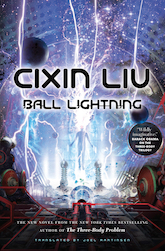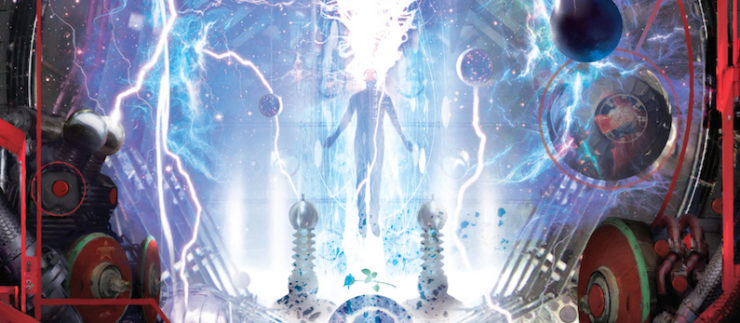Yeah, yeah—you’ve already heard no shortage of praise for Chinese science-fiction writer Cixin Liu. But here’s the thing: He deserves all of it. Liu’s Remembrance of Earth’s Past trilogy—the remarkable, Hugo-winning series published in America as The Three Body Problem, The Dark Forest, and Death’s End—is just as mind-bending and breathtaking as its fans claim. (And, not for nothing, those fans include this guy.)
Until this week, the Remembrance trilogy and a scattering of short stories were all that English-speakers had of Liu’s unforgettable work. But with the American publication of Ball Lightning—a novel originally published in China in 2004, and now translated into English by Joel Martinsen, the translator of The Dark Forest—we finally have more Liu.
Is it as good as the Remembrance trilogy? Well… no, but it’s still pretty great. This’ll sound like a backhanded compliment, but I mean it in the best way possible: The only time Ball Lightning disappoints is when one compares it to Remembrance of Earth’s Past.
Buy the Book


Ball Lightning
Serving as a very loose prequel to The Three Body Problem, Ball Lightning has a far smaller scope: Here, Liu’s focus is almost entirely on Chen, an awkward, obsessive researcher who, at age 14, at the worst birthday party ever, witnessed both of his parents get obliterated by a mysterious, fiery orb. Chen, understandably, is just a bit affected by the incident, and devotes himself to studying the mysterious phenomenon of ball lightning. “Ball lightning had molded me into this form: from that night of terror in my youth, the shape of my psyche had been determined,” Chen explains. “I was destined to live my whole life with a terror no one else could feel.”
As he ages, Chen remains single-mindedly focused on learning the secrets of ball lightning; early on, he describes himself as “a machine in pursuit of a single goal.” That’s on page 17—and, unfortunately, page 17 is about where his character development stops. Luckily for us, Chen’s accompanied by more interesting characters: Alongside befuddled military brass, half-mad scientists, and swaggering helicopter pilots who’d fit right in with the ego-fueled flyboys of The Right Stuff, Chen meets Lin Yun, a morbid army researcher who’s intent on using ball lightning as a weapon, and Ding Yi, a lively wildcard of a theoretical physicist. Ding Yi’s the book’s best character—he pops up later in Three Body—and in Ball Lightning, his curiosity overwhelms any personal and ethical considerations. Unlike Chen’s morose plod toward discovery, Ding Yi’s passion to decode the universe comes with the thrill of social and moral transgression: “Extraordinary research must be advanced through extraordinary measures,” he insists. “Otherwise, in this rigid society, science wouldn’t budge an inch.”
As Ball Lightning clips along, we visit lightning-burned mountaintops, a nuclear power plant seized by terrorists, and an eerie, forgotten outpost beneath Siberia—and all the while, ball lightning seemingly pops in and out of existence at random, inspiring and frustrating Chen and his companions. “The descriptions in this book of the characteristics and behavior of ball lightning are based on historical records,” reads Ball Lightning’s epigraph, but heads up: Things get weird. I don’t want to spoil how weird, but: Things get weird enough that before the real weirdness even starts, Chen’s tossing off observations like, “It was impossible for your spirit not to be affected by watching ball lightning turn group after group of test animals to ash every day.”
That, though, leads to one of Ball Lightning’s quirks: Like the Remembrance trilogy, this book operates at a cool remove, thanks to prose that sometimes feels straightforward and at others feels distant and overly formal. Unless you’re smarter than me and can compare the Chinese and English versions, it’s impossible to know if this stiltedness is Liu’s original intent, a result of cultural differences, a byproduct of translation, or all three. (Translating Liu, it seems, is no easy task: As Ken Liu, a frequent translator of Cixin Liu’s, wrote in Clarkesworld, “Conflict between the author and the translator is present in every act of translation, but it’s especially acute in contemporary passages between English and Chinese.”) When Liu’s dealing with far-out sci-fi concepts, the clunkiness of the prose rarely draws attention to itself—but with human emotion, there’s no avoiding it. “I was unaccustomed to being alone with the opposite sex, or to their refined sensitivity,” Chen explains while spending time with Lin Yun. “But to find those feminine qualities so concentrated in a woman piloting a land mine-equipped car was breathtaking.” Later, after witnessing Lin Yun in a moment of distress, he not-so-helpfully notes, “This episode informed me that her life was far more complicated than I imagined.”
But even in the Remembrance trilogy, beautifully written characters aren’t Liu’s strong suit—he’s more interested in, and better at, cracking open the big ideas of space and time. And in Ball Lightning, he’s drawn to the blood that stains humankind’s greatest discoveries. “All of the major scientific advances this century—aerospace, nuclear energy, computers—are the result of scientists and military personnel, two groups on different paths, combining what their different goals had in common,” Lin Yun tells Chen. Sure, that’s hardly a unique observation, but Liu delivers it with an acidic sting. As is the case with the viciously cold logic of The Dark Forest, Liu’s worlds have no room for sentiment.
Liu himself seems… pragmatically optimistic? “I believe science and technology can bring us a bright future, but the journey to achieve it will be filled with difficulties and exact a price from us,” he told The New Yorker in 2015. “Some of these obstacles and costs will be quite terrible, but in the end we will land on the sunlit further shore.”
That shore is rarely glimpsed by Ball Lightning’s characters, who obsess over the universe’s unknowns for darker reasons: childhood trauma, cruel bloodlust, sociopathic curiosity. As usual, Liu is a master at evoking awe and horror at the scale and strangeness of our universe—but here, he also lays bare why we study it. One of the book’s war-scarred characters might put it best: “All the forces of the natural world, including those that people believe are the most gentle and harmless, can be turned into weapons to destroy life.”
Ball Lightning is available from Tor Books.
Listen to an excerpt from the audio book here.
A writer, editor, and male model, Erik Henriksen lives in Portland, Oregon. He’s written for the Portland Mercury, The Stranger, io9.com, Wired.com, and Tor.com. (Hey! That’s this site!) Learn all you ever wanted to know and more at henriksenactual.com.










